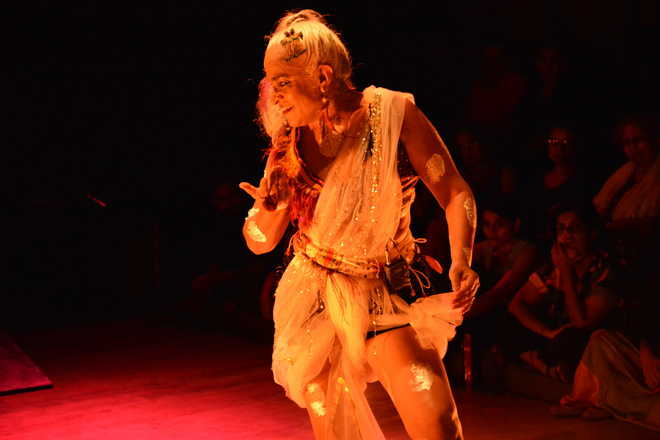A woman let loose
Neha Kirpal
Maya Krishna Rao says Loose Woman is the story of a free spirit that goes through the ordinariness of everyday life but chooses her own direction, and effortlessly blends in her existence, her musings on matters that touch our life and times. She says this solo act, in a way, embodies her life itself.
The show, which will be staged as part of the upcoming Mahindra Excellence in Theatre Awards (META) in New Delhi from March 6 to 11, melds bits of life through a range of episodes using song, dance, theatre and video. It has the protagonist driving through the streets, finding her mother gardening, playing with a ball at night on a highway and dancing with abandon.
“Loose Woman is about a performer trying to discover all the ways in which a woman can stretch herself across many spheres — from the mind, to the spirit, the home, people and relationships.” It was presented as a visual arts piece at the Serendipity Arts Festival in Goa recently and will now be staged within META’s conventional theatre space.
Known for her feminist and protest theatre, Maya says this art form satisfies her urge to express burning issues. “Theatre is a form that must move its audiences intellectually and emotionally. The challenge, therefore, lies in how to explore the form to respond to different issues and the themes associated with them,” she says.
Walk, her play in response to the 2012 Delhi gang rape, is one of her most acclaimed works. Sometimes modified into a street play, it is still showcased at various platforms and venues. It has been performed at a forum about an alternative republic, at a forum questioning sedition and at an event that focused on the importance of the Right to Information Act in a democracy. Another of her performances, In The Name of My Cow, has been performed at a Not In My Name forum.
What’s interesting is Maya manages to use humour as a mechanism to respond to issues with such serious themes. “The trick lies in picking up events and making a hard-hitting comedy on them. So, while people are laughing, they are also getting the message,” she explains.
She recently employed humour in an act about the #MeToo movement. “Needless to say, it’s a cause of concern for a lot of people. We need to see how we can step back and look at it through comedy,” she adds.
In 2010, Maya received the Sangeet Natak Akademi Award, which she returned in 2015 citing growing intolerance in India. The real trigger for her, she says, was the Dadri incident. “Repeated killings and harassments were taking place and the government was doing nothing about it. It was getting very difficult to keep quiet. At such times, it becomes necessary to return an honour given by the government,” she says.









